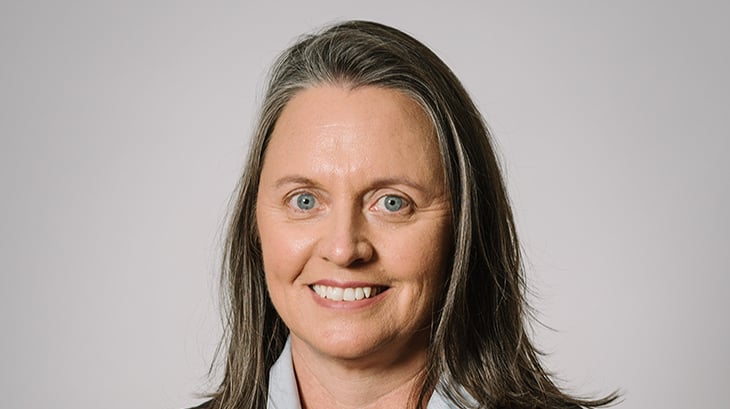Bleat Box: Meet Belinda Dexter

Belinda Dexter grew up in Perth, WA and gained her degree in commerce and accounting before heading to the Northern Territory for a change of scenery. She worked as a governess for the Underwood family at remote ‘Bunda Station’ in the Victoria River Downs area, where she met her husband Will. They moved to Will’s home state of Victoria and are now based on their own small farm at Eurack, where Belinda works as Group Financial Controller for Australian Lamb Company, bought last year for $400 million by South American multinational, Minerva Foods.
For university graduate Belinda Dexter, travelling from Perth in the mid-1990s to work as a governess on the remote 178,800-hectare Bunda Station in the Northern Territory was “a fantastic experience”.
It was also the start of a journey that led to marriage, a new career and Ms Dexter’s current home at Eurack in western Victoria, where she is Group Financial Controller for Minerva Foods/Australian Lamb Company at nearby Colac.
Her role at Bunda involved supervising the Underwood family’s children for an hour each week on School of the Air radio, followed by sessions in the Station classroom completing projects and workbooks.
Two or three times a year, the station staff travelled eight hours to the nearest large town, Katherine, for the annual agricultural show or rodeo. It was in the Territory that she met her future husband Will, who was employed as a jackaroo at a neighbouring station.
The couple moved back to his home state of Victoria and after a few years living in Melbourne, where Ms Dexter worked in public health, they moved to Eurack.
In 2000, she took on the role of Finance Coordinator for the local lamb and mutton processor. At the time the struggling Colac abattoir was in the process of being rebuilt by a group of determined local investors who didn’t want to see the processing sector lost to the town.
CRF Group secured a contract to supply Coles supermarkets and never looked back.
“The investor group essentially started from scratch, but they had vision and commitment, and 23 years later, the business has grown and matured and is now the biggest employer in Colac with more than 900 workers,” Ms Dexter said.
“I would never have thought I’d be working in the processing sector, but it’s been an incredible journey and so interesting. It’s an amazing business with an incredibly diverse workforce.
“Meat processing is an innovative industry that’s always learning and trying new things, not just around elements like robotics and the workforce, but also how to ensure from a processor perspective that the industry is sustainable.”
Australian Lamb Company operates two large export-licensed facilities at Colac and Sunshine in Melbourne, supplying a range of lamb products into domestic food service and retail markets and exporting to more than 70 countries.
Ms Dexter has seen four ownership changes in 23 years and pays tribute in particular to the success of the Verrall family, who bought the CRF Group in 2013 and built it up before selling to Brazilian-based multinational Minerva Foods in October 2022.
“Alongside a very significant investment in capital expansion the Verralls focused on a more diverse workforce, including more women, and working to change the perspective of what an abattoir is and what it means to people,” she said.
“Our site is an amazing place to work, set on the shores of Lake Colac with the best views in town. In the early years we had a lot of Sudanese employees and they have been joined by Chinese, Taiwanese and Pacific workers, and now many South American employees.”
Prior to being invited to join the Sheep Sustainability Framework in March 2022, Ms Dexter held a role representing processors on the committee of the Sheep and Goat Traceability Task Force, overseeing the introduction of Victoria’s mandatory individual electronic identification (eID) for sheep and goats.
“Traceability of our livestock in a timely manner is essential to protecting our industry and ensuring we can provide the best information to our consumers about animal welfare, food safety and provenance,” she said.
Sustainability is another element that Belinda says is ever evolving.
“We certainly look to longevity of relationships with those who can provide the product that’s ideal for us. Our suppliers are generally producers who are interested in whole-of-farm management and understanding what the market’s looking for, whether that’s from the perspective of managing grass seed or carcase weights.
“Sustainability around animal welfare is also critical to our operation. Being an export-accredited facility, we have a huge number of checks and balances in place, and even more than that, we want to work in an environment that’s as good as it can be.
“Our sustainability commitment has always been site-based but Minerva Foods is publicly listed, so they have a really big sustainability push and requirements they have to fulfil as well as the resources to implement them.”
Ms Dexter said she’s enjoyed the ‘learning curve’ of being a member and hearing different perspectives from the Sustainability Steering Group and believes it’s important to remain flexible.
“I think the future will be a combination of bedding down things and measuring to provide usable data,” she said.
“While we need constant review, there also has to be baseline measurement to monitor improvement and progression.
“Industry and consumers will determine whether a factor is important to sustainability. We just need flexibility to recognise things might change and we change with them.
“The Sheep Sustainability Framework has some very clever and passionate people working behind the scenes. It’s a really important tool that we as an industry can speak to and people can use to show what we’re doing and what’s important.”
More information
Contact:
Resources: